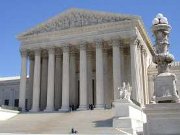
USA (MNN) — This week, the Supreme Court ruled five to four against the pleas of the Christian Legal Society in the highly anticipated Christian Legal Society v. Martinez. The effects of the decision could be significant for many.
The case began when CLS, a college campus ministry, barred a homosexual student from leadership in the group's California Hastings College of Law chapter. Hastings College redacted its recognition of CLS on campus as a result, and CLS in turn sued. After two federal court decisions held conflicting rulings, the case was taken to the Supreme Court. (For fuller case details, click here.)
When the case went to the Supreme Court last April, Mission Network News spoke with Alec Hill, president of campus ministry InterVarsity Christian Fellowship. At the time, Hill predicted grave implications if the case were to turn out against CLS. His fears have now been realized.
Hill says the court's ruling essentially overlooked the ways CLS had been wronged and focused more on the loaded concept of discrimination. Hill points out that although CLS had been wronged in three specific breeches to the First Amendment (Freedom of Association, Freedom of Speech and Freedom of Religion), the Supreme Court still ruled against them.
"The five members [who voted against CLS] found the idea that a recognized student organization could discriminate based on religion or based on sexual orientation to be so offensive that that trumped the First Amendment rights or issues," explains Hill.
The ramifications of this decision could be immense. The ruling suggests a step back in freedoms for various organizations in the future.
"I think [the ruling] is a significant step for American culture away from its Judeo-Christian roots," says Hill. "It does represent a secularization of a marginalization of faith to the edges. I didn't think that I would see that from this Supreme Court in my lifetime." Hill, who is a lawyer and has watched cases like these for years, notes: "The court, without saying it, really has reversed itself on 30, 40 years of its past ruling with this decision."
The four justices that voted for CLS seem to agree. According to the American Center for Law and Justice, in a dissent written by Justice Samuel Alito and joined by Chief Justice Roberts and Justices Scalia and Thomas, Justice Alito calls the decision "a serious setback for freedom of expression in this country."
From a ministry perspective, the ruling does not bode well–not for CLS, nor for other campus ministries like InterVarsity. InterVarsity has 860 chapters compared to CLS' 30 and is therefore at high risk of future consequences due to this ruling. Hill says the certainty that their ministry will be affected is based on past Supreme Court decisions that have changed the way they do ministry, including a ruling allowing them to meet in public places and one granting them access to incoming students. InterVarsity is still assessing just how this recent decision will affect their ministry; they know it will indeed leave its mark.
"This will have a significant impact on how we do our ministry," says Hill. Hill believes ministry will be harder, but says he's convinced InterVarsity will continue to do ministry regardless.
Pray for wisdom for InterVarsity, the Christian Legal Society, and other similar ministries as they continue to reach out to students and live out the Gospel. Pray that the Lord would protect these vital ministries and that any future persecution would only reap more fruit.
To read the opinions of the American Center for Law and Justice on the case, click here.
